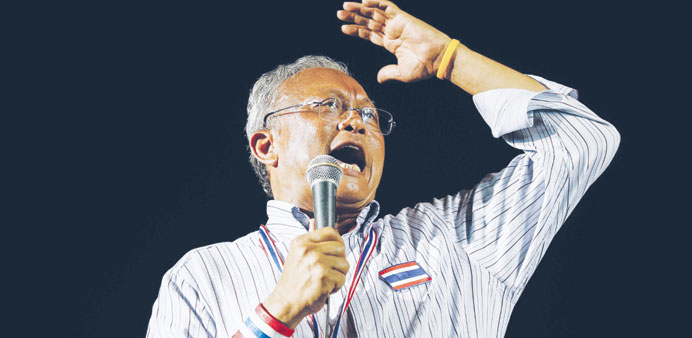|
Thai Prime Minister Yingluck Shinawatra, 46, struggled to control her emotions yesterday as she announced that she was dissolving parliament to call a new general election. |
The announcement took many by surprise, including her own foreign minister.
Surapong Tovichakchaikul told a room full of diplomats and journalists an hour earlier that Yingluck would only dissolve parliament if protest leader Suthep Thaugsuban agreed it would solve the crisis.
“This dissolution was decided by the prime minister without consulting anyone in the cabinet,” a senior government official said.
But Yingluck presumably did consult her elder brother, Thaksin Shinawatra, who is at the heart of the country’s seemingly endless political crisis.
“Of course she did,” said the official, who requested anonymity.
Yingluck’s two-years-plus premiership has been dogged by accusations that she is the puppet of her brother, a former premier who has been living abroad since 2008 to avoid a two-year jail sentence for abuse of power.
When Yingluck campaigned for the position in the election of July 2011, Thaksin dubbed her his “clone,” a tag she has tried to live down unsuccessfully.
The latest round of street protests was ignited on November 1, when the ruling coalition in the Lower House pushed through an amnesty bill that would have pardoned politics-related crimes committed during 2004-13.
Along with hundreds of corruption-related cases, the amnesty would have erased Thaksin’s conviction.
The bill outraged Bangkok inhabitants, drawing thousands of office workers to the streets of the capital where they blew whistles and demanded Yingluck’s resignation.
The premier backtracked when she saw tens of thousands of Thais mobilise against it. On November 11, the Senate rejected the legislation, paralysing it for a 180-day waiting period.
Her government suffered another blow on November 20, when the Constitutional Court ruled that a Lower House bill to amend the composition of the Senate breached the constitution of 2007.
The ruling Pheu Thai Party refused to accept the judgment, opening Yingluck up to accusations by the opposition Democrat Party that her government had lost legitimacy by rejecting the court’s jurisdiction, and therefore the constitution.
The argument is crucial to protest leader Suthep’s strategy, which is prove that there is a power vacuum requiring the invoking of Article 7 of the constitution.
Although vague and debatable, the article could pave the way for the appointment of a prime minister, endorsed by the king, who could then appoint a “People’s Council” and “People’s Government,” as demanded by Suthep.
Leading figures in Suthep’s People’s Committee for Democratic Reform movement have already rejected Yingluck’s dissolution of parliament as failing to meet their demands, since she and her cabinet will remain as caretakers until a new election is held within 60 days.
Suthep resigned his seat as a parliamentarian with the Democrat party in late October to head the protest movement.
On Sunday, Democrat lawmakers announced their resignation en masse to join the protests.
“The Democrats know that if there is a new election, they are not likely to win, and then the Pheu Thai Party can bring back the amnesty bill again and pardon Thaksin,” said Panitan Wattanayagorn, a political scientist at Chulalongkorn University.
Suthep has hinted at how he intends to “uproot the Thaksin regime” if a People’s Council is established and allowed to draft reforms.
“We need stronger counter-corruption laws. For instance the statute of limitations is only 10 years on corruption cases. I want to see no expiration period,” Suthep said.
Under the current statute of limitations, Thaksin’s could return a free man in 2018.
But if Suthep wins his campaign to install a People’s Council, some still question that he would ever be able to rid Thailand of the influence of Thaksin.

